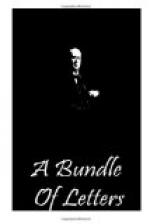There are two of the English who I suppose are very cultivated too; but it doesn’t seem as if I could enter into theirs so easily, though I try all I can. I do love their way of speaking, and sometimes I feel almost as if it would be right to give up trying to learn French, and just try to learn to speak our own tongue as these English speak it. It isn’t the things they say so much, though these are often rather curious, but it is in the way they pronounce, and the sweetness of their voice. It seems as if they must try a good deal to talk like that; but these English that are here don’t seem to try at all, either to speak or do anything else. They are a young lady and her brother. I believe they belong to some noble family. I have had a good deal of intercourse with them, because I have felt more free to talk to them than to the Americans—on account of the language. It seems as if in talking with them I was almost learning a new one.
I never supposed, when I left Bangor, that I was coming to Europe to learn English! If I do learn it, I don’t think you will understand me when I get back, and I don’t think you’ll like it much. I should be a good deal criticised if I spoke like that at Bangor. However, I verily believe Bangor is the most critical place on earth; I have seen nothing like it over here. Tell them all I have come to the conclusion that they are a great deal too fastidious. But I was speaking about this English young lady and her brother. I wish I could put them before you. She is lovely to look at; she seems so modest and retiring. In spite of this, however, she dresses in a way that attracts great attention, as I couldn’t help noticing when one day I went out to walk with her. She was ever so much looked at; but she didn’t seem to notice it, until at last I couldn’t help calling attention to it. Mr. Leverett thinks everything of it; he calls it the “costume of the future.” I should call it rather the costume of the past—you know the English have such an attachment to the past. I said this the other day to Madame do Maisonrouge—that Miss Vane dressed in the costume of the past. De l’an passe, vous voulez dire? said Madame, with her little French laugh (you can get William Platt to translate this, he used to tell me he knew so much French).
You know I told you, in writing some time ago, that I had tried to get some insight into the position of woman in England, and, being here with Miss Vane, it has seemed to me to be a good opportunity to get a little more. I have asked her a great deal about it; but she doesn’t seem able to give me much information. The first time I asked her she told me the position of a lady depended upon the rank of her father, her eldest brother, her husband, etc. She told me her own position was very good, because her father was some relation—I forget what—to a lord. She thinks everything of this; and that proves to me that the position of woman in her country cannot be satisfactory; because, if it were, it wouldn’t depend upon that of your relations, even your nearest. I don’t know much about lords, and it does try my patience (though she is just as sweet as she can live) to hear her talk as if it were a matter of course that I should.




